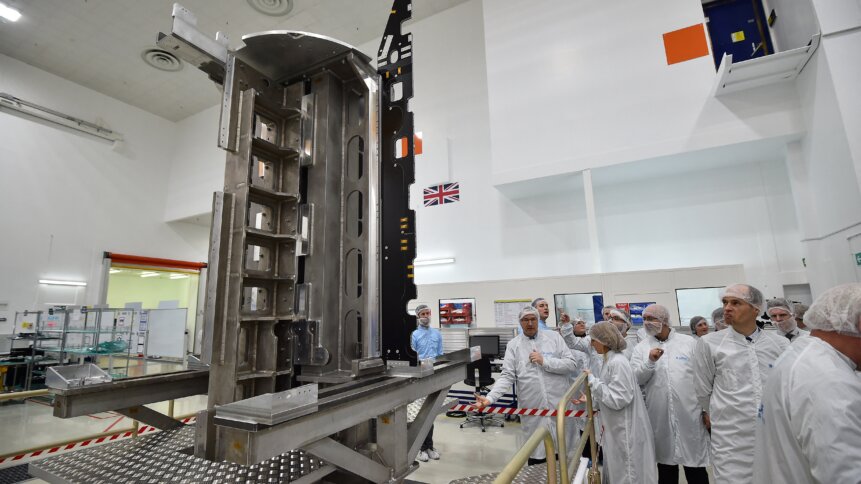World’s first center focused on commercial quantum computing, coming to the UK

Construction will soon be underway for the first laboratory dedicated to quantum computing research. A breaking-ground ceremony was held earlier today at the UK’s National Quantum Computing Centre (NQCC) facility in Oxfordshire, ahead of the commencement of construction works of the center that will be funded by £93 million over five years, with the goal of speeding up the development of scalable, practical quantum computers.
Professor Sir Peter Knight, chair of the National Quantum Technology Programme (NQTP)’s Strategy Advisory Board, led the formal breaking-ground ceremony at the NQCC building site, based within the Rutherford Appleton Laboratory in Harwell, Oxfordshire. The NQCC is a new research institution, dedicated to accelerating the development of quantum computing research by addressing the challenges of scaling the emerging technology, allowing the UK to continue pushing the boundaries of this potentially transformative new field.
The national center is part of the UK’s NQTP – a ten-year, £1 billion program that aims to ensure the successful transition of quantum technologies from out of the laboratory, and into industry. One of the NQCC’s key goals is to be able to show a quantum computer with an excess of 100 qubits (a quantum bit, or qubit, being the basic unit of measuring quantum data) within the next five years, and the NQCC team is already commissioning its first tranche of quantum research and development projects.
The NQCC is the latest endeavor in the UK’s nascent, but thriving quantum research scene. Last year, nine major organizations from the local quantum computing industry revealed an industry-led quantum computing program called DISCOVERY, that similarly aimed to tackle quantum computing’s technology barriers on the path to commercialization. Like the NQCC, DISCOVERY was part-funded by UK Research and Innovation, a non-departmental public body of the UK government, which has consistently supported and funded efforts by startups and research facilities in the country.
The NQCC itself was formed as a result of a detailed technology roadmap developed by some of the country’s leading quantum experts over a two-year period. That roadmap’s findings, including key strengths of UK’s quantum community and the maturity of various tech platforms over the next 10 years, was used to incorporate packages across software, hardware and application development, that are now being awarded to both academic and industrial partners.
Today, the National Quantum Computing Centre (NQCC) – our first national centre – will hold a breaking-ground ceremony to mark the start of construction. The NQCC is dedicated to accelerating the development of #QuantumComputing in the UK. @STFC_Matters @EPSRC pic.twitter.com/oHM7i5XS23
— UK Research and Innovation (@UKRI_News) September 20, 2021
Last month, Riverlane became the first company to supply quantum software to the NQCC. The company will deliver a benchmarking software suite that can assess qubit errors and overall system performance, helping to reliably control the growing numbers of qubits necessary to power quantum computers. “This contract award to Riverlane is an initial step, demonstrating how we will form collaborations across industry and the research community to grow our capability,” said NQCC Centre Director Dr Michael Cuthbertin in a statement.
With strong access to the startups and labs that make up the UK quantum computing community, the NQCC is able to leverage the insight and breakthroughs of 41 startup firms that are building working business models as a result of the collaborative ecosystem fostered by the NQTP. Traditionally, the UK quantum field has been vilified for having strong research strengths but weak commercial prospects, and Director Cuthbert envisions the NQCC as accelerating the migration of scientific research into commercial use cases.
“[The 41 startups] are developing robust business models and making international connections that could enable them to become the major global players of the future,” he explains. “There is often a gap in skills and resources when going from purely academic research into the commercial sector, and the NQCC will be aiming to bridge that gap.”
While working towards the 100 cubits-plus machine will be an important step towards demonstrating the capability of quantum computers, Cuthbert is aware that it will not be able to challenge the performance of current-era supercomputers. Instead, the research journey to commercial applications is expected to be long and challenging — and other technologies might end playing critical roles along the way.
“We have said all along that it’s far too early to be picking winners. This was about identifying where we should start, rather than saying that this is the one and only technology decision we will ever take,” affirmed Cuthbert. “We will be continuously assessing that roadmap and the ongoing development of alternative platforms, and figuring out how to bring frontier development work into the NQCC program.”
Set to open in mid-2023, the 4035 square meters NQCC building will ultimately provide space for over 120 residents and researchers from academia, industry, government, quantum partner organizations, and quantum startups.










